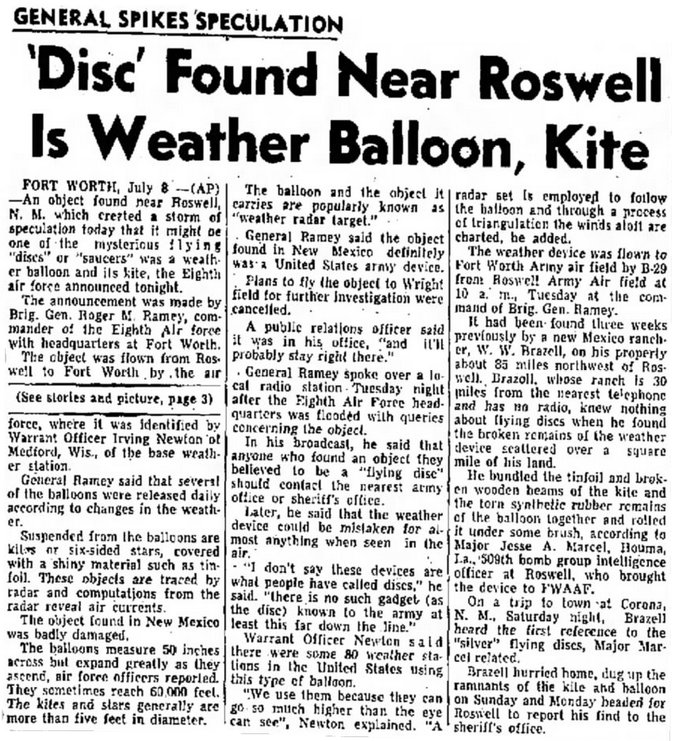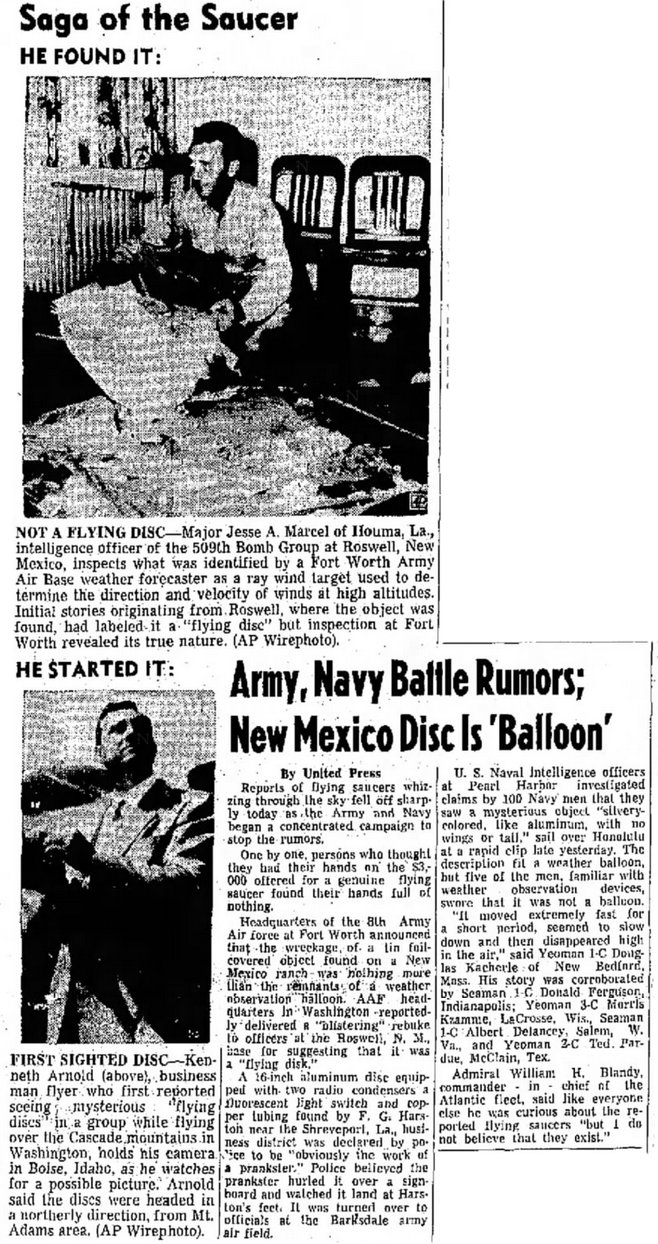The article below was published in the newspaper Abilene Reporter-News, Abilene, Texas, USA, pages 1 and 3, on July 9, 1947.

|
FORT WORTH, July 8 -- (AP) -- An object found near Roswell N. M. which created a storm of speculation today that it might be one of the mysterious flying "discs" or "saucers" was a weather balloon and its kite, the Eighth air force announced today.
The announcement was made by Brig. Gen. Roger Ramey, commander of the Eighth Air force with headquarters at Fort Worth.
The object was flown from Roswell to Fort Worth by the air
(See story and pictures, page 3)
force, where it was identified by Warrant Officer Irving Newton of Medford, Wis., of the base weather station.
General Ramey said that several of the balloons were released daily according to changes in the weather.
Suspended from the balloons are kites or six-sided stars, covered with a shiny material such as tinfoil. These objects are traced by radar and computations from the radar reveal air currents.
The object found in New Mexico was badly damaged.
The balloons measure 50 inches across but expand greatly as they ascend, air force officers reported. They sometimes reach 63.000 feet. The kites and stars generally are more than five feet in diameter.
The balloon and the object it carries are popularly known as "weather radar target."
General Ramey said the object found in New Mexico definitely was a United States army device.
Plans to fly the object to Wright field for further investigation were cancelled.
A public relations officer said it was in his office, "and it'll probably stay right there."
General Ramey spoke over a local radio station Tuesday night after the Eighth Air Force headquarters was flooded with queries concerning the object.
In his broadcast, he said that anyone who found an object they believed to be a "flying disc" should contact the nearest army office or sheriff's office.
Later, he said that the weather device could be mistaken for almost anything when see[n] in the air.
"I don't say these devices are what people have called disks," he said. "There is no such gadget (as the disk) known to the army - at least this far down the line."
Warrant Officer Newton said there were some 80 weather stations in the United States using this type of balloon.
"We use them because they can go so much higher than the eye can see," Newton explained. A radar set is employed to follow the balloon and through a process of triangulation the winds aloft are charted, he added.
The weather device was flown to Fort Worth Army air field by B-29 from Roswell Army Air field at 10 a.m., Tuesday, at the command of Brig. Gen. Ramey.
It had been found three weeks previously by New Mexican rancher, W. W. Brazel, on his property about 85 miles northwest of Roswell. Brazel, whose ranch is 30 miles from the nearest telephone and has no radio, knew nothing about flying discs when he found the broken remains of the weather device scattered over a square mile of his land.
He bundled the tinfoil and broken wooden beams of the kite and the torn synthetic rubber remains of the balloon together and rolled it under some brush, according to Maj. Jesse A. Marcel, Houma, La., 209th Bomb Group intelligence office at Roswell, who brought the device to FWAAF.
On a trip to town at Corona, N. M., Saturday night, Brazel heard the first reference in the "silver" flying discs, Major Marcel related.
Brazel hurtled home, dug up the remnants of the kite and balloon on Sunday and Monday headed for Roswell to report his find to the sheriff's office.

|
NOT A FLYING DISC -- Major Jesse A. Marcel of Houma, La., intelligence officer at the 509th Bomb Group at Roswell, New Mexico, inspects what was identified by a Fort Worth Army Air Base weather forecaster as a ray wind [sic, Rawin] radar target used to determine the direction and velocity of winds at high altitudes. Initial stories originating from Roswell, where the object was found, labelled it a "flying disc" but inspection at Fort Worth revealed its true nature. (AP Wirephoto).
FIRST SIGHTED DISC -- Kenneth Arnold (above), business man flyer who first reported seeing mysterious 2flying disc" in a group while flying over the Cascade mountains in Washington, holds his camera in Boise, Idaho, as he watches for a possible picture. Arnold said the discs were headed in a northerly direction, from Mt. Adams area. (AP Wirephoto).
By United Press
Reports of flying discs whizzing through the sky fell off sharply today as the army and navy began a concentrated campaign to stop the rumors.
One by one, persons who thought they had their hands on the $3000 offered for a genuine flying saucer found their hands full of nothing.
Headquarters of the 8th Army Air force at Fort Worth announced that the wreckage of a tin-foil covered object found on a New Mexico ranch was nothing more than remnants of a weather observation balloon. AAF headquarters in Washington reportedly delivered a "blistering" rebuke to officers at the Roswell, N. M., base, for suggesting that it was a "flying disc."
A 16-inch aluminum disc equipped with two radio condensers, a fluorescent light switch and copper tubing found by F. G. Harston near Shreveport, La., business district, was declared by police to be "obviously the work of a prankster." Police believed the prankster hurled it over a signboard and watched it land at Harston's feet. It was turned over to officials at the Barksdale army air field.
U. S. Naval intelligence officers at Pearl Harbor investigated claims by 100 Navy men that they saw a mysterious object "silvery-colored, like aluminum, with no wings or tail," sail over Honolulu at a rapid clip late yesterday. The description fit a weather balloon but five of the men, familiar with weather observation devices, swore that it was not a balloon.
"It moved extremely fast for a short period, seemed to slow down and then disappeared high in the air," said Yeoman 1-C Douglas Kacherie of New Bedford, Mass. His story was corroborated by Seaman 1-C Donald Ferguson, Indianapolis, Yeoman 3-C Morris Kzamme, LaCrosse, Wis., Seamn 1-C Albert Delancey, Salem, W. Va., and Yeoman 2-C Ted Perdue, McClain, Tex.
Admiral Willilam H. Blandy, commander - in - chief at the Atlantic fleet, said like everyone else he was curious about the reported flying saucers "but I do not believe they exist."